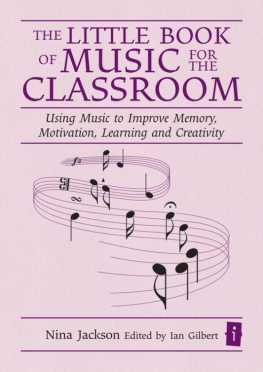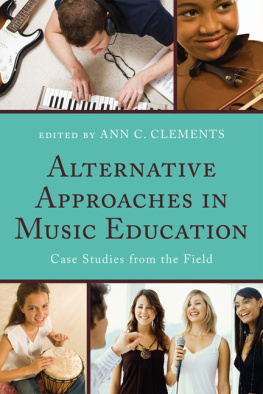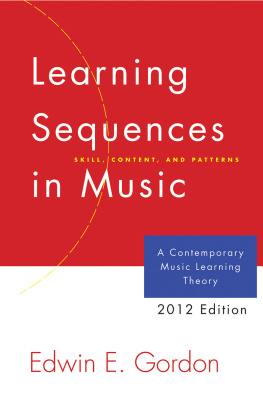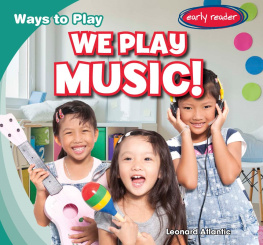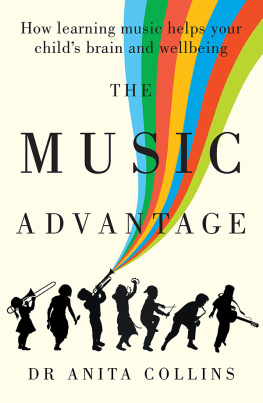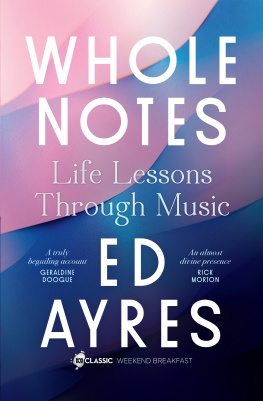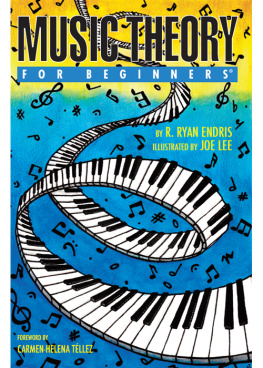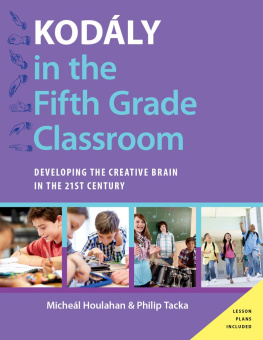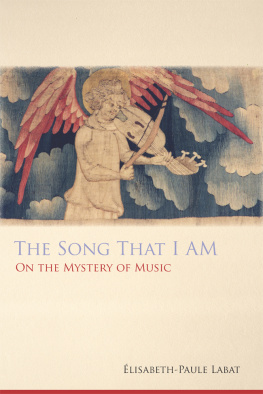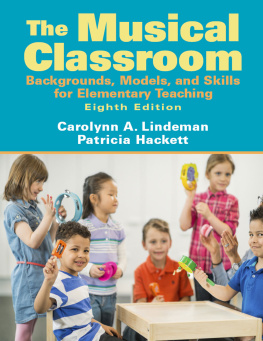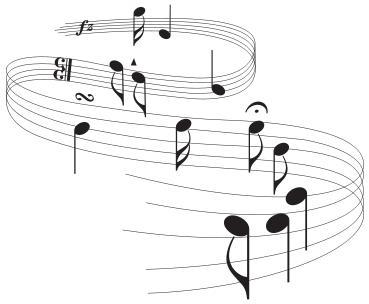Thanks also to my dear friend Sue Lyle of Swansea Metropolitan University who encouraged and supported my work from day one and continues to be my rock and motivator. To Ken Jones, whom I think of as The Man in the White Van, who sold me the Masters in Education course at Swansea Metropolitan University outside Marks & Spencer in Swansea because the modules were half price in the first year! Now Dean of the University, he is a true master of educational innovation.
To the GTCW which gave me my research scholarship to carry out Music and the Mind.
Thanks to those individuals who have offered ideas and encouragement that have kept the musical spark alive.
To Dick Hamer, who has opened my eyes to true happiness in the world of music, love and laughter, where jazz music continues to be a problem for me in more ways than one!
And finally, grateful thanks to Ian Gilbert, for believing in me as an educationalist, innovator and forward thinker, whose editorial skills have made this book readable, understandable and accessible. For my friends and colleagues at Independent Thinking Ltd, and to Crown House Publishing for their patience and understanding in putting together this book.
Let me start with a true story. I received an e-mail a few months ago from the wife of a primary teacher who had heard me speak about the many and varied uses of music in the classroom. Her husband had taken these ideas and thought them through professionally and properly. He wanted to have a go at using music in his classroom so he talked to his Headteacher about it, he talked to the children about it, he chose the music and the way he used it carefully and made specific allowances for those children who felt that it wouldnt help them learn. He then introduced a process of monitoring the effects and effectiveness of what he did. In short, he did things the way that Nina Jackson would be proud of.
What he found was that not only did the quality and quantity of learning improve but also behaviour was much better. Music used strategically and effectively was of considerable benefit to his classroom practice.
And then his Headteacher received the phone call.
One parent, one sole parent, one middle class, middle-England, Daily Mail reading narrow minded, bigoted, opinionated, did I mention Daily Mail reading, ignorant, close-minded, selfish, uninformed parent (alright, Im biased here, and not just against the Daily Mail) was on the phone complaining about the use of music in their childs classroom and how it was getting in the way of their childs learning. The teacher was called to see the Head where he explained the findings of his musical experiment and how the children loved having music in the classroom and learning and behaviour was improving across the board, including, ironically, for the child of the whinging parent.
Fortified by this the Headteacher explained to the parent what was going on and stood by his innovative teacher, allowing and encouraging the work to continue.
Then came the second phone call. Unhappy with the fact that their prejudices had been rejected in favour of the evidence, the parent had been on the phone to the Director of Childrens Services in the local authority. Now it was that Headteachers turn to be summoned.
And that was that.
Songbirds have been shown to have higher levels of dopamine when singing (especially when singing to a female), Java sparrows prefer music to sitting in silence, in Iowa bonobos have jammed with the likes of Peter Gabriel and Paul McCartney, and even carp can tell the difference between Bach and John Lee Hooker (which is probably more than our parent above).
Music seems to be part of the natural state of things, evolving in humans before language, according to some experts (the controversial concept of ur song) and fundamental not to what makes us human but to what makes us feel alive. Just like it is for the happy songbirds I mention above, as reported in a February 2008 NewScientist article, whose singing induced reinforcement learning with a secondary function that may be to create a feeling of euphoria.
So, music can improve learning and create a feel-good factor. But, of course, that would be so wrong in the classroom.
As Nina points out in this fascinating and practical LittleBook, music affects us body, mind and soul. The NewScientist article says Musical activity involves nearly every region of the brain that we know about, and nearly every neural subsystem and in his book Musicophilia, Oliver Sacks quotes Nietzsche who said We listen to music with our muscles with Sacks going on to describe how music can calm us, animate us, comfort us, thrill us or serve to organize us at work and at play.
Calm, animated, safe, excited and organised who wouldnt want a classroom full of children like that?
What Ninas research has shown and she is undoubtedly one of the UKs leading researchers and proponents of music for learning and motivation is that done properly, music is a powerful classroom tool and this book is designed to allow you quickly and easily to identify what music to use, when and why.
And as if Ninas arguments and evidence arent enough (and if you want more detailed overview of her research look at her chapter in The Big Book of Independent Thinking or go on to our website www.independentthinking.co.uk), here, based on my own experience, are eleven quick reasons why music can be of great benefit in your classroom:
- It helps get the learners in the right mental state for learning
- It helps get the teacher in the right mental state for teaching

